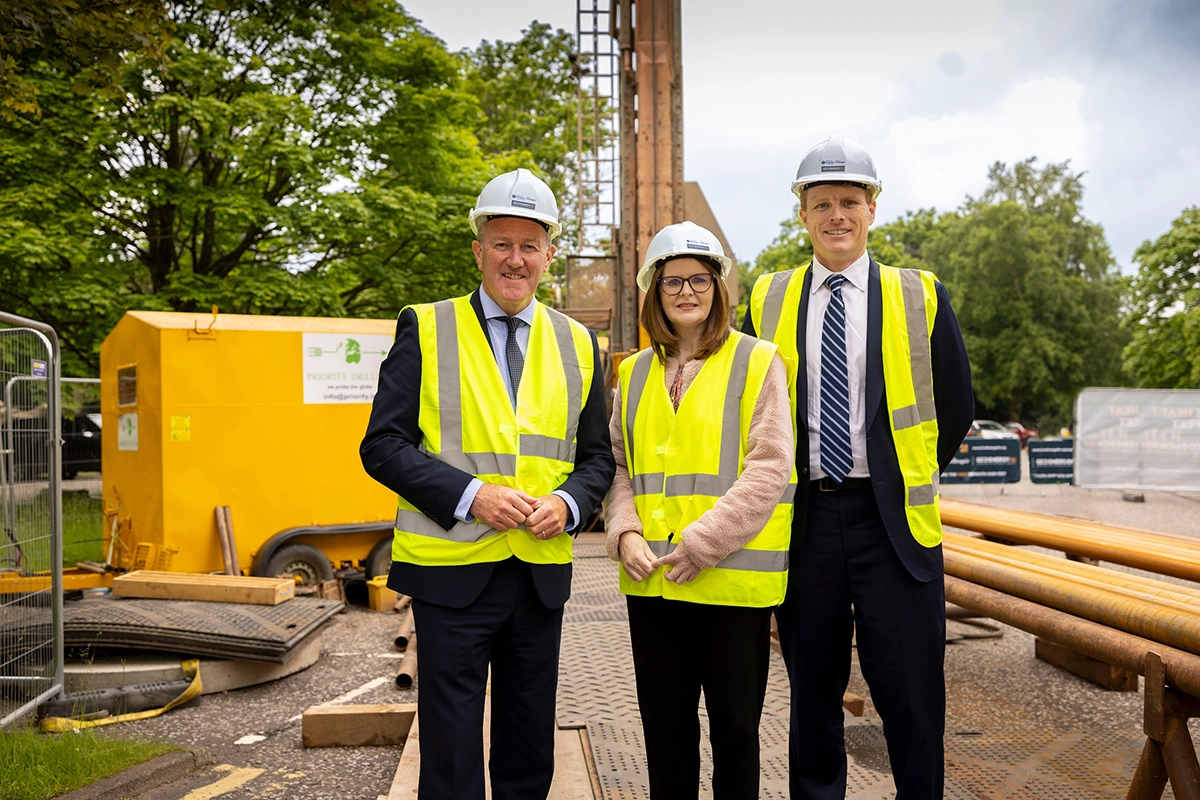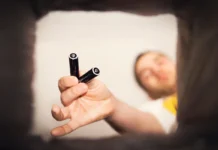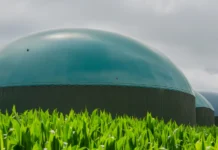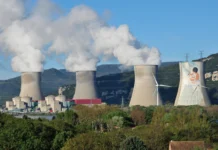
Exploratory geothermal drilling and testing on the grounds of Stormont Estate has begun as part of Northern Ireland’s Department for the Economy’s £3 million GeoEnergy NI project.
This is an important milestone in the overall demonstrator project which is examining both shallow and deep geothermal energy in two locations in Northern Ireland. It is believed that geothermal energy can play an important role in the decarbonization of the energy sector in pursuit of net zero carbon targets by 2050 (an overview of some of the approaches under development is available here).
The GeoEnergy NI project will inform the development of a policy and regulatory framework that can support the uptake of geothermal energy in Northern Ireland.
At Stormont, the study is examining shallow geothermal potential and its possible future application to provide sustainable low carbon, renewable heating and cooling systems for a number of pre-identified buildings on the Estate. It is hoped the project will result in a future geothermal heat network that will replace the current fossil fuel heating systems at some of the buildings on the Estate. Ultimately this will help meet the Northern Ireland Executive’s carbon reduction targets as well as reducing and stabilising heating costs. The second study is exploring the potential for a future deep geothermal borehole project on the CAFRE Greenmount campus near Antrim.
Among the first visitors to the borehole drill site, on 6 June, were economy Minister Conor Murphy, Finance Minister Dr Caoimhe Archibald and the US Special Envoy to Northern Ireland for Economic Affairs, Joe Kennedy III (pictured, above). Their attendance coincided with a schools visit to the location as part of the GeoEnergy NI project’s outreach and information programme where a group of pupils from Forge Integrated Primary School attended the Geo Energy Discovery Centre positioned nearby the first drill site.
Welcoming the latest milestone, Economy Minister Conor Murphy said;
“Our Economic Vision embraces the transition towards net zero which is both a legal duty under the Climate Change Act and a moral obligation for future generations. Geothermal energy, alongside other renewable technologies, can play an important role in how we decarbonise our economy.
“Despite being in its infancy, the geothermal sector is well positioned to thrive and with the right investment and support it can deliver real economic opportunities that will improve productivity, cultivate good jobs, and promote regional balance across the region.
“Whilst the North is fortunate to have very suitable geology for geothermal energy, it remains a relatively untapped resource here compared to other countries. That is why the GeoEnergy NI project is exploring and showcasing our geothermal potential – helping us ‘discover the heat beneath our feet’.
“Geothermal offers several distinct advantages and unlike other renewables is available 24/7, whatever the weather which makes it more predictable and reliable. This is a feature that can serve to stabilise energy costs and increase our security of energy supply.”
Minister for Finance, Dr Caoimhe Archibald added;
“My department is committed to doing all we can to contribute to meeting the emissions targets in the Climate Change Act. We recognise and stand ready to exploit the huge economic opportunities as we transition to a low carbon economy.”
“It is important for government to lead in tackling climate change and the decarbonisation of our economy.
“The study on the Stormont Estate will assess the potential future application of shallow geothermal to provide sustainable low carbon, renewable heating and cooling systems. We hope the project will inform a future geothermal heat network on the Estate that will replace the current fossil fuel heating systems at some of our buildings as well as helping to reduce and stabilise heating costs.
“The study will increase our understanding of the contribution that geothermal energy might make in decarbonising the way we heat our buildings and help inform future projects in the public and private sectors and in domestic settings.
“Ultimately, an assessment will be made of the possible contribution that geothermal energy could make towards helping meet the Executive’s carbon reduction targets.”
Welcoming the progress on the project US Special Envoy to Northern Ireland for Economic Affairs, Joe Kennedy III said;
“It was very interesting to see this important geothermal project up close today and to meet the specialist team delivering it. We all know the importance of tackling the climate crisis and with it the massive opportunity to develop a green economy which helps the world move away from its reliance on fossil fuels to reach energy transition and critical net-zero carbon targets.”
It is estimated that the drilling and testing phase of the Stormont feasibility study will take approximately 6 months. It will involve the drilling and testing of five boreholes, four of which will be hydrogeology boreholes around 250 metres deep, and one borehole will be cored to 500 metres depth. A series of tests and analyses including down-hole geophysics will then be carried out on the boreholes to identify the optimum numbers and depths of boreholes required to deliver low carbon and renewable heat to the Stormont Estate.
You can find out more about the GeoEnergy NI project and Northern Ireland’s overall geothermal potential on the project website www.GeoEnergyNI.org or by following @GeoEnergyNI on social media channels.







